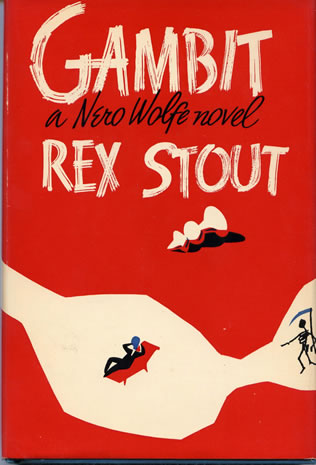This is the story which opens with Wolfe burning Webster's 3rd Edition, having judged it to be "intolerably offensive."
ALSO READ:
SYNOPSIS:
The dictionary defines "gambit" as a stratagem. In chess play it is a particular type of stratagem in which a piece is sacrificed in order to gain an advantage. The victim in this story is a chess master who agrees to do a simultaneous blindfold exhibition for the "Gambit Club" a chess club for rich snobs. In a blindfold simul, the master plays several opponents without looking at any of the boards. It is usually accomplished by the master sitting with his back to the array of boards. In this exhibition, the master sat in a different room sipping cocoa while four messengers brought the moves to him from his twelve opponents. One of the opponents actually played a counter gambit.
When the master keels over dead from arsenic poisoning, the club member who brought him the cocoa becomes the prime suspect. Wolfe refuses to believe that the cocoa deliverer committed the murder because he will have to return the $22,000.00 retainer paid him by the suspect's daughter if the suspect actually proves to be guilty.
Wolfe decides that the only way the suspect could be innocent would be if one of the messengers had sacrificed the master as a gambit to incriminate the suspect. But he lacks one essential fact to be able to prove his case.
Wolfe devises a gambit to get that fact, but someone sacrifices the witness who can give it to him. He then decides that he can find the true killer in the first murder by the stratagem of solving the more easily investigated second murder.
Then Wolfe gets the fact which cost the second victim his life, and he decides that his only hope to solve either murder is to devise a gambit which sacrifices his confidential assistant, Archie Goodwin.
Wolfe calls all the suspects together, announces he has fired Archie for incompetence, and then . . . .
QUOTATION:
"Wolfe was patient. 'First you inquired about my furniture and my habits, then about my probity, and now about my private affairs. Can't you contrive a question which deserves an answer?'" (p. 31)
REVIEW:
Jacques Barzun and Wendell Hertig Taylor, A Catalogue of Crime — There is more detection in this story than in any other of the mulling-and-quizzing sort; here we really see Nero Wolfe's thoughts whirring. Moreover, Archie is in excellent form, and although a chess tournament is a feature, the game itself is not. The great scene is that in which Nero reads and burns the pages of Webster's Dictionary, Third Edition
Although not specifically a review of Gambit, the following letter from Rex Stout to his publisher shows he was:
- delighted that Jacques Barzun stated in an article in The New Republic that "Nero Wolfe stories are literature"
- punctilious about his deadlines, even though he missed the one for Gambit by two weeks











